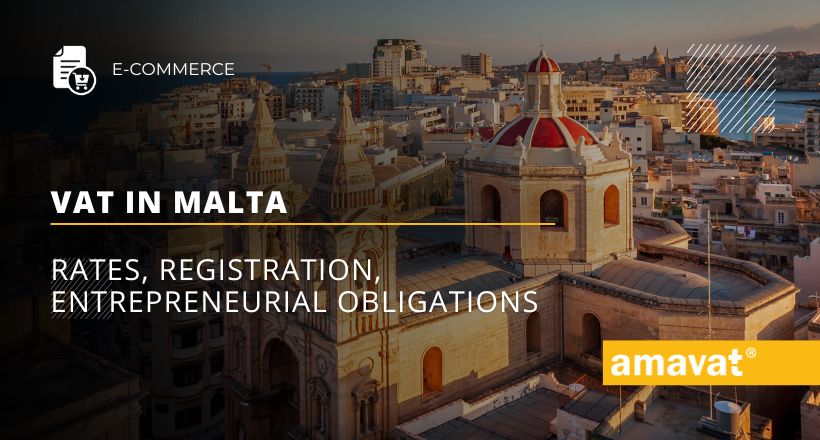VAT in Malta: Rates, registration, and entrepreneurial obligations
VAT in Malta, similar to other EU countries, is based on EU directives, but national regulations introduce some variations. These include different tax rates, specific products and services subject to VAT, and procedures related to taxpayer registration. These aspects are especially important for companies operating in Malta or selling goods and services to its residents, as they must comply with local VAT requirements. In this article, we will take a closer look at Malta’s tax regulations, focusing on VAT rates and the registration process.
VAT rates in Malta
The standard VAT rate in Malta is 18%, making it one of the lowest among EU member states. This rate applies to most goods and services that do not qualify for reduced rates. Apart from the standard rate, Malta has four other VAT rates: 12%, 7%, 5%, and 0%.
12% VAT rate
From January 2024, Malta introduced a new 12% VAT rate. It applies to services such as the rental of recreational boats, selected healthcare services, securities storage services, and some services related to credit and guarantee management.
7% VAT rate
The 7% VAT rate applies to tourism services, particularly accommodation and the use of sports facilities. This rate supports Malta’s tourism sector, which plays a significant role in the national economy.
5% VAT rate
The 5% reduced VAT rate covers a wide range of products and services, including food items (such as confectionery), medical equipment and accessories, products for the disabled, printed materials (e.g., books and newspapers), electricity, as well as artwork, antiques, and collectibles.
0% VAT rate
The 0% VAT rate covers not only intra-community transport, as in most EU countries, but also prepared food, prescription medicines, and services related to food production. This rate is crucial for sectors such as pharmaceuticals and food.
VAT registration in Malta
The obligation to register for VAT in Malta applies to both local and foreign entrepreneurs conducting business in the country. Regulations include companies involved in importing and exporting goods, selling to consumers in Malta, and storing goods on its territory. Additionally, companies providing services or selling goods within the European Union must register if their turnover exceeds €10,000 per year. After exceeding this threshold, entrepreneurs must charge and remit VAT in the buyer’s country or use the VAT OSS system.
The VAT registration process in Malta is relatively straightforward. It can be done online by submitting the required documents to the Office of the Commissioner for Revenue. Documents needed include the company’s statute, registry entry, and proof of identity of the applicant. Depending on the type of activity and annual turnover, there are three main types of VAT registration.
Article 10 registration
This type of registration applies to businesses with an annual turnover exceeding €30,000. Companies must file quarterly VAT returns and can claim VAT refunds. They receive a VAT number with the “MT” prefix.
Article 11 registration
Companies with turnover not exceeding €30,000 can register under Article 11. In this case, businesses are not required to pay VAT but also cannot claim VAT refunds. They receive a VAT number without the “MT” prefix.
Article 12 registration
Article 12 registration applies to entrepreneurs who exceed the €10,000 threshold and make intra-community acquisitions of goods in Malta. Companies registered under this article must submit monthly VAT returns.
VAT declarations and payments
Businesses registered for VAT in Malta must regularly submit tax returns. The standard reporting period is three months, but the tax authority may set a different cycle, such as monthly or bimonthly. VAT returns and payments must be submitted within 52 days after the end of the reporting period.
Reverse charge mechanism in Malta
Malta has also introduced the “reverse charge” mechanism, which shifts the VAT reporting obligation from the supplier to the buyer. This mechanism applies to sectors such as construction, internal transactions within VAT groups, and foreign companies providing services in Malta. This solution simplifies tax reporting, positively affecting companies’ cash flow.
Intrastat in Malta
Intrastat in Malta, as a statistical reporting obligation, applies to businesses engaged in the import and export of goods within the European Union. This system allows the monitoring of goods movement between EU member states. Malta follows the same reporting rules as other EU countries but has the lowest reporting thresholds, set at just €700. Entrepreneurs must submit relevant reports by the 10th day of the month following the reporting period.
Summary
VAT in Malta is relatively straightforward, though it has specific regulations that may differ from tax systems in other EU countries. It is essential for businesses operating in this market to be aware of applicable VAT rates, registration procedures, and obligations related to tax reporting. Thanks to flexible regulations and the possibility of using different forms of registration, the VAT system in Malta allows companies to adjust their tax obligations to suit their business needs.






